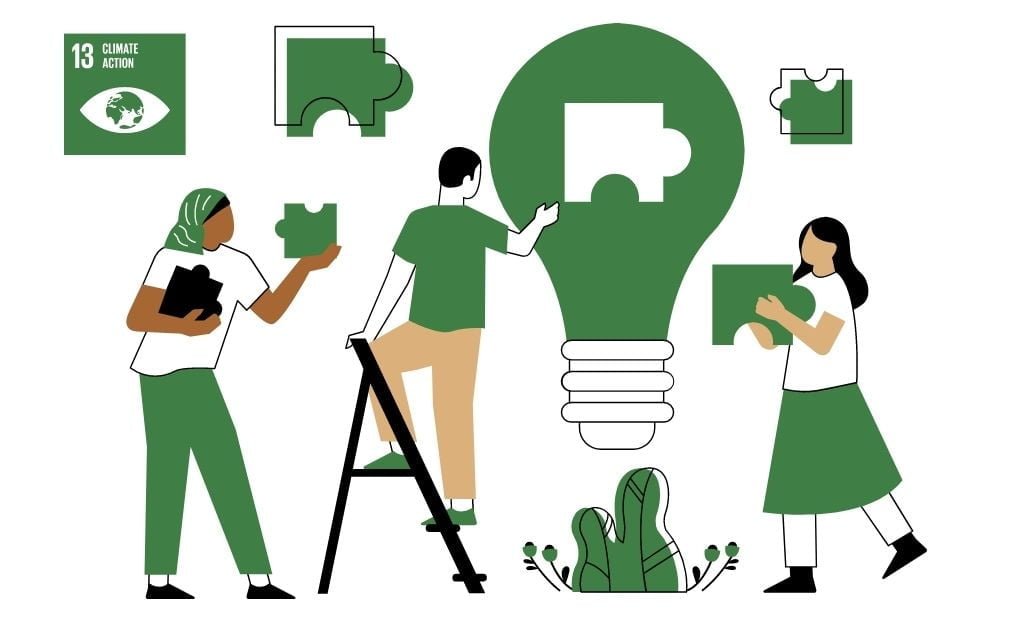Building a Green Future
Vincent McCarthy talks to Aidan McKenna, manager of the Climate Enterprise Action Fund at Enterprise Ireland

"A key part of our message to companies is that there is a very strong business case for embedding sustainability at the core of your business strategy."
Vincent: Enterprise Ireland has played an important role in supporting the development and growth of indigenous companies. Is the recent launch of the “Ready for A Green Future” campaign a signal that Enterprise Ireland is prioritising sustainable development?
Aidan: The sustainability and low carbon agenda are important issues for Enterprise Ireland.
The Government legislation currently going through the Oireachtas has ambitious emissions reduction targets. The enterprise sector accounts for approximately 13% of emissions currently so its important that the sector plays its part in our national climate change targets. This year, we launched a new Climate Enterprise Action fund to help companies start or accelerate their sustainability pathways to reducing their emissions. Enterprise Ireland is currently developing our corporate strategy for the next 3 years with a view to 2030. I’ve no doubt that sustainability and helping our client’s transition to a low carbon economy will be a central pillar of our strategy going forward.
Vincent: Consumers and investors are now placing much greater emphasis on sustainability – driven by the scale of the challenges, increased awareness, and regulation. Does the new Climate Enterprise Action Fund represent the first step in helping companies to adapt to changing demands?
Aidan: Supporting Irish companies to reduce their carbon footprint and capitalise on opportunities emerging from the low-carbon transition is a key strategic priority for Enterprise Ireland.
As Irish businesses continue to adapt to the evolving Covid-19 pandemic and prepare for getting back on the road to recovery , we need to also build resilience and ensure Irish companies have the capabilities in place to meet the challenges of climate change.
Climate Enterprise Action Fund is a pilot initiative by Enterprise Ireland. It will provide very tangible support to companies beginning or progressing their sustainability journey. It also gives Enterprise Ireland an opportunity to have conversations with companies about their current strategy and how they intend to progress this agenda in the coming years. These conversations will be important as Enterprise Ireland looks at future measures that can help us achieve our goals.
Vincent: What are the specific supports available to companies under the Climate Enterprise Action Fund?
Aidan: There are three main supports available.
- The Climate Action Voucher – an €1,800 grant to engage consultants to identify opportunities in a business and develop plans in areas like resource efficiency, renewable energy and the circular economy.
- Green Start – Up to €5,000 support to measure your company’s carbon footprint and help identify ways to reduce emissions and improve efficient use of resources.
- Green Plus – Grant funding for 50% of costs of developing a comprehensive climate change and sustainability plan and aligning to international standards and frameworks.
Vincent: Within the ESG context– Environmental, Social, and Governance – the focus of the fund is primarily on the Environmental (E) pillar. What are the main objectives and does the fund have measurable targets with key indicators?
Aidan: The Government has set a target of 50% reduction in emissions by 2030 and Enterprise Ireland’s strategy is fully aligned to that goal.
For the current Climate Enterprise Action Fund we have internal targets for each of the three main offers. However, just as important will be the lessons we, as an agency, will learn from this pilot scheme and how it can shape future strategy in this important area.
Vincent: My understanding is that the fund is open to existing clients of Enterprise Ireland. How can these companies avail of the supports under the fund and are there options for businesses that are not clients of Enterprise Ireland?
Aidan: The best way to find out more information on the scheme is to go to our dedicated web page:
www.globalambition.ie/climate-enterprise-action-fund or search for ‘Climate Enterprise Action Fund’. This web resource gives details on the scheme and allows you to apply online.
Our colleagues in the Local Enterprise Offices have an excellent Green for Micro scheme that businesses not within Enterprise Ireland’s remit will find very useful. Further details on that scheme are available www.localenterprise.ie/green
We recognise the scale of this challenge to decarbonise the Enterprise base extends beyond Enterprise Ireland. We are working across government departments and with other agencies and bodies to ensure there is a consistent approach to meeting this challenge. A SME hub will be launched later in the summer to support all SME’s get advice and be signposted to relevant agencies for support.
Vincent: The supports for helping companies to develop climate action plans is based on the principle of ‘what gets measured gets done’. However, the scale of the climate challenge today is because of the failure to follow through on previous ambitious plans, going back to the 90s. How can Enterprise Ireland ensure that companies follow through on their climate action plans?
Aidan: I think the wider environment has changed with, for instance, the inclusion of emissions targets in legislation and the adoption of climate budgets. We’ve learnt from the experience of the past and now a much greater emphasis and commitment is given to transparent targets and measuring progress on that journey.
We have adopted those principles into our climate strategy, and we will monitor progress and adapt our plans when the data requires it.
Vincent: Irish companies had to contend with Brexit. Then Covid hit and it meant companies had to channel all their resources into ensuring the future of the business, securing financial sustainability. Has this been a big setback for the climate ambitions of Enterprise Ireland?
Aidan: The past 15 months have brought unprecedented challenges for Irish business. However, we have seen remarkable resilience and innovation in the enterprise sector as it dealt with challenges across multiple fronts. That resilience is demonstrated by the recent 2020 export results released by Enterprise Ireland that showed exports held up throughout 2020.
The experience of dealing with the pandemic and the 1st January Brexit deadline will prove valuable as Irish enterprise looks to climate change and sustainability. Our message to businesses in relation to Brexit was that planning was key – ensure that you have a Brexit plan, avail of supports through agencies like Enterprise Ireland and LEO and be prepared. That message worked and we’ll bring the lessons of that campaign to our strategic planning in relation to climate change.
Vincent: In general, do you think Irish companies recognise the risk of not taking sustainability seriously from a business perspective? Or is a large part of the challenge still around increasing awareness and education to bring about the cultural change needed?
Aidan: A key part of our message to companies is that there is a very strong business case for embedding sustainability at the core of your business strategy.
Increasingly consumers are demanding higher environmental standards and transparency in supply chains. Also, many multinational corporations now place on high weighting on sustainability of suppliers and set this as a necessary qualification to be part of their supply chain. Our overseas offices that provide market intelligence to our clients are already bringing that message loud and clear. In June, we had our UK team highlight the requirements of the UK Construction sector have as they embrace the drive to Net Zero Carbon and what that means for Irish suppliers. We are also seeing investment funds and access to capital being influenced by environmental considerations.
Thinking about how a market will look in five to 10 years time is a key part of an agile, scaling business. This medium to long-term analysis confirms the urgency with addressing climate change and sustainability now. That is a message that is resonating with Irish business.
Vincent: Given that Enterprise Ireland is the largest seed capital investor in Ireland, investing directly in start-ups, will embedding sustainability in the investment process across all funds become the new standard?
Aidan: There is a growing trend among investors and fund managers to place a weighting on sustainable practices, environmental standards and future plans. In terms of the future growth and viability of a business having a strong sustainable strategy is essential so that is already factored into Enterprise Ireland assessment of investments. We recognise that there is work to be done in apply consistent international standards as to the measurement and reporting for ESG. We will continue to monitor developments in this area to see if our current mandate needs to specifically require certain international standards or commitments to achieve transparent sustainability goals.
Vincent: Overall, the success of all future plans depends on our willingness and capacity to change. Are you optimistic about the future, for future generations?
Aidan: The challenges are huge, but as is often said in relation to the climate debate ‘there is no planet B’ so our efforts have to deliver.
I have been encouraged by the engagement of companies in relation to the Climate Enterprise Action Fund. Every company has faced unprecedented challenges these past 15 months, but they are also future focused. They are looking at their business strategy for the future and know that sustainability and climate must be central to their plans.
In addition, I think that the wider societal awareness and action in relation to climate change will also influence the enterprise sector as we seek to achieve the ambitious goals that will make a difference to this and future generations.
End
Contact: Vincent McCarthy, CFA
